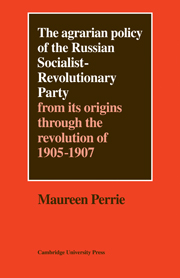 The Agrarian Policy of the Russian Socialist-Revolutionary Party
The Agrarian Policy of the Russian Socialist-Revolutionary Party Book contents
- Frontmatter
- Contents
- Preface
- Acknowledgements
- Note on dates and transliteration
- Map of regions and guberniyas of European Russia
- Introduction
- Part I From Populism to the SR party (1881–1901)
- 1 The Populist legacy
- 2 The first peasant Brotherhood
- 3 The Agrarian-Socialist League
- 4 Rural propaganda in Saratov guberniya
- 5 The party and the League
- Part II The campaign for the peasantry (1902–1904)
- Part III The revolution of 1905
- Part IV The aftermath of revolution (1906–1908)
- Conclusion
- Glossary
- Bibliography
- Index
1 - The Populist legacy
Published online by Cambridge University Press: 07 October 2011
- Frontmatter
- Contents
- Preface
- Acknowledgements
- Note on dates and transliteration
- Map of regions and guberniyas of European Russia
- Introduction
- Part I From Populism to the SR party (1881–1901)
- 1 The Populist legacy
- 2 The first peasant Brotherhood
- 3 The Agrarian-Socialist League
- 4 Rural propaganda in Saratov guberniya
- 5 The party and the League
- Part II The campaign for the peasantry (1902–1904)
- Part III The revolution of 1905
- Part IV The aftermath of revolution (1906–1908)
- Conclusion
- Glossary
- Bibliography
- Index
Summary
Historically, the origins of Socialist-Revolutionary activity among the peasantry can be traced to the ‘movements to the people’ of the 1870s. After the failure of these attempts by the Populist intelligentsia to convert the peasantry to the cause of revolutionary socialism, their secret organisation, Zemlya i volya (‘Land and liberty’), split into two groups, Chernyi peredel (‘Black repartition’) and Narodnaya volya (‘People's will’). These two parties represented the two major trends which had developed within the Populist movement after the failure of the ‘movements to the people’. Chernyi peredel, while retaining the essential programme of Zemlya i volya, with its faith in a peasant revolution, in practice concentrated its efforts on the urban workers. Its leaders, Plekhanov and Aksel'rod, soon left Russia for Switzerland, where they later created the first émigré Marxist group. In view of the prevailing disillusionment among the revolutionaries concerning the possibilities of a mass socialist movement, the organisation in Russia soon petered out. Narodnaya volya, on the other hand, rejected the policy of propaganda among the masses in favour of a campaign of systematic terrorism aimed at the political overthrow of the autocracy, which overthrow they considered to be a necessary prerequisite of socialist revolution in Russia. The organisation had a brief but spectacular career which culminated in the assassination of Alexander II in 1881. This act, however, brought down upon the terrorists the forces of reaction and repression, and the organisation of Narodnaya volya was virtually destroyed.
- Type
- Chapter
- Information
- The Agrarian Policy of the Russian Socialist-Revolutionary PartyFrom its Origins through the Revolution of 1905–1907, pp. 5 - 13Publisher: Cambridge University PressPrint publication year: 1977
